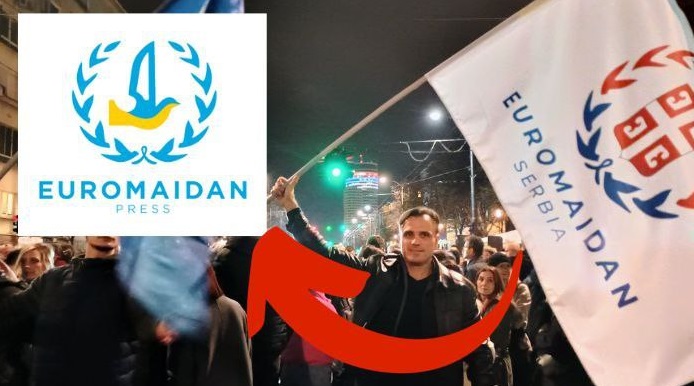
About 2,500 radicalized opposition supporters gathered in Belgrade and attempted to storm city hall after contested snap parliamentary elections last week. Sputnik asked leading geopolitical analysts, including a top American Balkans expert, for their takes on what happened, and who could be pulling the strings behind the scenes.
Sunday’s protests in the Serbian capital were a brazen attempt by the West to destabilize the situation in the Balkan country using “Maidan coup techniques,” Russian Foreign Ministry spokeswoman Maria Zakharova told Sputnik after being asked to comment on events in Belgrade from the night before.
Thousands of angry supporters of Serbia’s opposition assembled in 2 degrees Celsius weather in the center of the capital on Sunday, unsatisfied with the results of recent snap parliamentary elections, which were won by President Aleksandar Vucic’s Serbia Must Not Stop coalition, claiming the vote was rigged and demanding a revote.
Curiously, the Organization for Security and Co-operation in Europe’s observation mission did not exactly march lockstep with Brussels’ “rigging” narrative, instead complaining about alleged “procedural deficiencies” that could just as easily be applied to elections in the US and most other Western liberal democracies.
“Though technically well-administered and offering voters a choice of political alternatives, [the elections] were dominated by the decisive involvement of the President which together with the ruling party’s systemic advantages created unjust conditions,” the OSCE assessment said.
“Fundamental freedoms were generally respected in the campaign,” the mission admitted,
Ultimately, the OSCE mission concluded that it could not find any instances of vote rigging, confirming that “election day was smoothly conducted,” barring some “procedural deficiencies.”
“Serbia has long been a sore point for NATO and the EU,” Dr. George Szamuely, an American geopolitical commentator and senior research fellow at the London-based Global Policy Institute, told Sputnik, explaining the motivations behind possible Western support for a Maidan-style coup attempt in Belgrade at this particular moment in time.
“Serbia, along with the Republika Srpska (half of Bosnia and Herzegovina) have been the holdouts on NATO. Neither entity wants to join NATO. And both entities have refused to go along with the NATO-EU policy towards Russia. Both refused to impose any kinds of sanctions on Russia,” Szamuely, a renowned expert on the Western policy toward the former Yugoslavia, recalled.
“So this is a sore point because essentially NATO has encompassed the entirety of the European continent, with the exception of Serbia and the Republika Srpska, and NATO obviously wants to bring that to an end…They’ve been trying to push Vucic out for some time, and they’ve been trying to get rid of Milorad Dodik, the president of the Republika Srpska at the same time,” the observer said.
“What’s also important is that from the beginning, from the 1990s on, Serbia has always been seen as a substitute for Russia. Where Serbia is, there is Russia. It’s the one thing that prevents NATO from complete dominance of the Balkans. And it’s the area where Russia continues to have some influence in Europe. So if you want to push Russia out of Europe altogether, you have to deal with the ‘Serbia problem’. They came close from 2000 on, when you had the color revolution that overthrew [Slobodan] Milosevic. And then for the next eight years, they had this opposition that ruled and then the West recognized the independence of Kosovo. So they came close, but they couldn’t quite pull this off. And so this has been an ongoing thing to try to rectify the unfinished business from the 1990s,” Szamuely said.
For his part, political analyst and former Member of the European Parliament Nick Griffin told Sputnik that the coup attempt in Belgrade is a sign of NATO’s growing “desperation” as it loses on other fronts, militarily and economically, against its global adversaries.
“I suspect that the West’s current Maidan effort in Belgrade is less about a carefully considered long-term plan and more a desperate flailing response to the NATO disaster unfolding in Ukraine,” Griffin said. “The scale of the defeat there is such that Western powers are in dire need not only of a distraction but also of a ‘victory’.’”
“On top of the above short-term issues arising from the Ukraine debacle, the disruption to shipping in the Red Sea has pushed the Chinese Belt and Road project back up to the top of the geopolitical agenda. The close relations established recently between Hungary and Serbia, which include major improvement works to the railway links between the two, take on greater significance with the possibility that ongoing tensions and conflict in the Middle East will make overland trade routes from China to Western and Arab markets much more important and profitable,” Griffin explained, highlighting the complex difficult calculations at play in the Balkans.
“Serbia has the potential to be hugely important as the final stepping stone to the Adriatic and beyond – especially if the victory of Russia in Ukraine were to convince Vucic to stop trying to walk the tightrope and to come down firmly on the Russian side and to push to connect Serbia properly to the Serbian enclaves on the coast,” the observer stressed.
“There is absolutely no good reason to allow this half-cock Western adventurism to succeed, or even to continue. The lesson from the Kiev Maidan should surely be that it is far easier to deal with such things while they are being done by Western-funded hooligans and agitators than to wait until they are sitting in NATO-supplied tanks,” the veteran geopolitical observer summed up.
read more in our Telegram-channel https://t.me/The_International_Affairs

 10:27 03.01.2024 •
10:27 03.01.2024 •






















